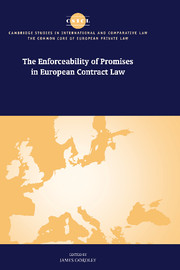Book contents
- Frontmatter
- Contents
- General editors' preface
- List of contributors
- Table of legislation
- List of abbreviations
- 1 Some perennial problems
- 2 Contemporary solutions
- Case 1 promises of gifts
- Case 2 promises of compensation for services rendered without charge
- Case 3 promises to pay debts not legally due
- Case 4 a promise to come to dinner
- Case 5 promises to store goods without charge
- Case 6 promises to do a favour
- Case 7 promises to loan goods without charge
- Case 8 a requirements contract
- Case 9 promises to pay more than was agreed I
- Case 10 promises to pay more than was agreed II
- Case 11 promises to do more than was agreed; promises to waive a condition
- Case 12 promises to take less than was agreed
- Case 13 options given without charge
- Case 14 promises of rewards
- Case 15 promises of commissions
- 3 Comparisons
- Index by country
- Index by subject
Case 2 - promises of compensation for services rendered without charge
Published online by Cambridge University Press: 18 May 2010
- Frontmatter
- Contents
- General editors' preface
- List of contributors
- Table of legislation
- List of abbreviations
- 1 Some perennial problems
- 2 Contemporary solutions
- Case 1 promises of gifts
- Case 2 promises of compensation for services rendered without charge
- Case 3 promises to pay debts not legally due
- Case 4 a promise to come to dinner
- Case 5 promises to store goods without charge
- Case 6 promises to do a favour
- Case 7 promises to loan goods without charge
- Case 8 a requirements contract
- Case 9 promises to pay more than was agreed I
- Case 10 promises to pay more than was agreed II
- Case 11 promises to do more than was agreed; promises to waive a condition
- Case 12 promises to take less than was agreed
- Case 13 options given without charge
- Case 14 promises of rewards
- Case 15 promises of commissions
- 3 Comparisons
- Index by country
- Index by subject
Summary
Case
Kurt promised a large sum of money to Tony who had suffered a permanent back injury saving (a) Kurt or (b) Kurt's adult child from drowning after a boating accident. Can Tony enforce the promise if Kurt changes his mind? Does it matter if Tony was a professional lifeguard or if he had performed the rescue as part of his normal duties?
Discussions
FRANCE
Kurt promised Tony a large sum of money for saving him or his adult child because he felt under a moral duty to do so. Under French law, this duty could be considered to be a natural obligation (obligation naturelle). As already noted in discussing Case 1, a promisor who voluntarily undertakes to perform a natural obligation is bound by this promise and liable to the promisee if he fails to perform. The natural obligation has been converted into a civil one by a unilateral promise to perform. Nevertheless, his recognition of the natural obligation must be sufficiently unequivocal. Evidence concerning the promise is appreciated by the trial courts and is considered to be a matter of pure fact.
The rule that a promise to perform a natural obligation is binding is a result of judicial interpretation of art. 1235 of the Civil Code. promise is not specifically enforceable. Yet its breach gives rise to contractual liability. Through Kurt's voluntary undertaking, the natural obligation has been novated (in a non-technical sense) and can thus be considered to be a civil obligation.
- Type
- Chapter
- Information
- The Enforceability of Promises in European Contract Law , pp. 67 - 87Publisher: Cambridge University PressPrint publication year: 2001



